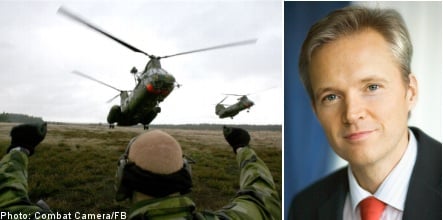“The reason is that I want to carry out a renewed and updated security policy assessment taking into account what happened in Georgia. We need a serious analysis of what has happened,” Tolgfors told the Svenska Dagbladet newspaper.
Just days after a Georgian military offensive into the breakaway republic South Ossetia prompted Russia to send troops into Georgia, Tolgfors continued to assert that the new defence plan would be ready this autumn.
But the prolonged presence of Russian troops on Georgian territory has caused Tolgfors and others involved in the defence planning process to reassess the future of Sweden’s military.
The defence minister now says that past reports submitted last December and June by the government’s commission on defence will be given a new supplement to be prepared by the government and the Armed Forces.
While Sweden has 30,000 active duty troops, a decision taken earlier in the decade to scrap many of the resources needed for mobilization means that it would currently take one year to mobilize 10,000 Swedish ground troops, according to SvD.
The speed at which Russia was able to mobilize its troops for the Georgia campaign gave Tolgfors and others in Sweden’s defence establishment pause.
“We saw in Georgia that it wasn’t huge forces, a few tens of thousands of men at its peak on the Russian side. However, it happened very fast – and Sweden’s military hasn’t been under political control in that way previously,” said Tolgfors to SvD.
“What we see in Georgia is that speed is a deciding factor. It wasn’t a large force, but rather that Russia has committed to rapidly mobilized and accessible units.”
While the government has said previously that it wants to trim defence expenditures by nearly 2 billion kronor ($297 million) over the next three years, Tolgfors offered little information on how the new defence policy assessment would affect any eventual funding.
“I won’t comment on how the funding will look. On the other hand, it is important to take a look at resource utilization,” he told the paper.


 Please whitelist us to continue reading.
Please whitelist us to continue reading.